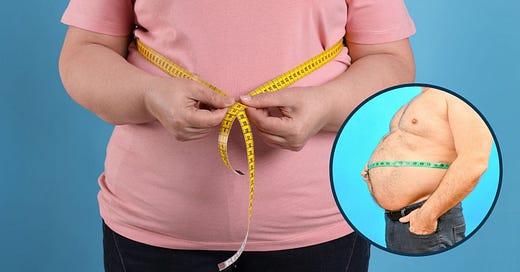Belly fat - a threat to your epic retirement
It's easy to look away or say that an epic retirement is all about your money and financial plans. But it's more than that. It's thinking about all the choices that lead to a longer, better life.
In this edition
Feature story: Belly (or visceral) fat - a threat to your epic retirement
Prime Time Podcast: How much do you really need to retire in comfort
From Bec’s Desk this week
#Ad 🌟 Maximize your brand's impact: Epic Retirement sponsorship opportunity! 🚀
Join us in shaping epic retirements! Become a sponsor or partner for 2024.
Reach over 25,000 individuals passionate about preparing for and living their best retirement each week. Elevate your brand in our exclusive email sponsor position. Your support fuels our commitment to providing valuable info, education, and resources. Connect with engaged pre and post retirees, showcase your brand in our weekly emails, and make a lasting impact. Act now - contact us at bec@epicretirement.com.au. Be part of the journey to empower retirees to live their best lives!
Belly fat: a threat to your epic retirement
None of us want to carry fat around our middle. But far beyond the cosmetic concerns, research is telling us that visceral fat, often referred to as belly fat, is increasingly important to manage as we age if we want to maximise our healthspan. So for those chasing down an epic retirement, worrying about your waistline is medically important.
According to scientists, there is a close relationship between the higher amounts of visceral fat that arrives after midlife, and the increase in insulin resistance, and inflammation. And these three symptoms, together have been shown time and again to be leading contributors to age related diseases later in life like cardiovascular disease, hypertension, diabetes and metabolic syndrome and even cancer.
Those quite frankly are enough reasons to get us worrying about our belly fat - as we plan for and live out our retirement.
What is visceral fat?
Before midlife, most people become quite accustomed to managing body weight and subcutaneous fat, but this is not the same type of fat that we have to tackle in the second half of life. As we age, both men and women experience an increase in visceral fat, which is harder to shift and often requires significant changes to lifestyle.
Visceral fat is the fat stored around internal organs like the liver, pancreas, and intestines. It has long been recognised as a contributor to various health issues. But its significance becomes even more pronounced as we age. Post-midlife, both men and women often experience an increase in visceral fat, which is closely linked to changes in hormonal profiles and metabolic function. It plays out as an increase to the waistline, presenting as a ‘tummy’ or more rounded midsection. And it is important to recognise the effect that this changing body shape can be having on your whole body’s functions, and how you can take steps to manage it.
What are the warning signs?
The warning signs are a waist circumference of above 89sm for women and 102cm for men. In reality, these are well beyond the goal. According to health literature, men should really be targeting a waist circumference of no more than 94cm, and women 70cm.
So what can you do to bring your visceral fat under control?
As we age, it becomes increasingly vital to take proactive steps to manage visceral fat and mitigate its associated risks. And the management of visceral fat requires different activities to managing subcutaneous fat, according to many scientific studies in this space.
Exercise regularly
The World Health Organisation recommends 150 minutes of moderate intensity exercise, and two sessions of muscle strengthening and flexibility activities per week. Medical specialists and scientists say you need a good balance of vigorous cardiovascular exercise and strength training to impact your visceral fat ratios.
Eat for reduced inflammation
Have you ever stopped to experiment with the types of foods that increase and decrease inflammation in your body? You may not even realise that some foods are triggering internal inflammation, until you actively start swapping foods out. Simple food swaps from high-inflammation causing foods like wheat and sugar, to fruit, vegetables, complex carbohydrates, lean proteins and healthy fats (avocadoes, fatty fish, seeds and such) have been shown to have a big impact on visceral fat ratios. As has increasing your fibre intake, potentially even supplementing it to ensure you are taking in 25 grams or more of fibre each day.
Scientists also recommend increasing your intake of high protein foods like eggs, fish, meat and dairy products.
Improve your sleep
There is a prominent scientific link between reduced sleep duration and increases in visceral fat. The ideal amount of sleep found through the studies of thousands of people is about 8 hours. Beyond this, the benefits of sleep seem to plateau. But less than this, and there is a significantly negative correlation. So if you want to manage your visceral fat, work on your sleep habits.
Contemplate probiotic, magnesium and fibre intake and gut health
Recent studies underscore the critical link between gut health and the storage of visceral fat. According to my research, there’s three key areas within your diet to take a deeper look at — probiotics, magnesium, and fibre intake - each of which wield significant influence over visceral fat storage. These three dietary elements can have a huge impact on long-term weight and visceral fat management. But let’s explain how.
Increasing your fibre intake - studies consistently show that individuals who incorporate more fibre into their diets experience notable improvements in these aspects. The key lies in the role of fibre in nurturing a healthy lower gut microbiota, fostering an environment that discourages the accumulation of visceral fat.
Increase your absorption of magnesium - The benefits of increasing your fibre intake extend beyond fibre alone. Magnesium, often hailed as a "magic mineral," that is significantly associated with lower inflammation and ageing related diseases. Notably, the fibre in your diet contributes significantly to the absorption of magnesium from food sources. Magnesium, in turn, has been linked to various health benefits, including its potential to influence visceral fat storage. Magnesium is also shown to have anti-inflammatory benefits, particularly if absorption is improved with increases to dietary fibre. These anti-inflammatory improvements can have a direct impact on ageing.
Consider probiotics in your diet - Considering probiotics adds another layer to the equation. Probiotics, the beneficial bacteria that promote gut health, have garnered attention for their potential in managing visceral fat. Incorporating probiotic-rich foods or supplements into your diet could foster a balanced gut microbiome, contributing to a healthier distribution of fat in the abdominal region.
Consider intermittent fasting
Another valuable strategy for those combatting visceral fat is to explore intermittent fasting. An extensive body of research has delved into the benefits of this approach, often highlighting its positive impact through two main lenses. Firstly, intermittent fasting tends to affect visceral fat by reducing overall calorie intake, achieved through the adoption of condensed eating windows during the day. Secondly, it has demonstrated notable anti-inflammatory benefits, further enhancing its potential as a multifaceted tool in the battle against visceral fat.
There’s no easy answer to managing visceral fat, only the need to act on it, seeking out a healthier lifestyle, regular exercise, improvements to diet and sleep. And don’t forget to seek support from medical professionals if you think it will help.
You really need your body to be in good shape to have an epic retirement. It’s not just a passing requirement. You know it and I know it.
Studies
https://pubmed.ncbi.nlm.nih.gov/36966579/
https://www.ncbi.nlm.nih.gov/pmc/articles/PMC6611773/
https://pubmed.ncbi.nlm.nih.gov/26288012/
https://pubmed.ncbi.nlm.nih.gov/36575144/
How much do you really need to live in comfort?
If you're heading toward the next phase of your life, you've probably asked yourself this big question: How much money do I really need to retire comfortably? This week I tackle it head on in the Prime Time podcast. Is there a magic number? Will I ever be able to quit my job or start stepping back from full time work? How do I work it all out for myself?
This week I have invited radio personality and weekends presenter at 4BC 882, Spencer Howson back onto the show to chat about money with me, and help me break down this big and important topic. With Spencer’s help I take a deep dive into how to plan for your retirement and build your own set of numbers, explaining how to build a vision for your retirement years and then calculate your numbers against that vision. He’s a blessing in disguise, making this tough topic much more relatable.
Listen now
LISTEN HERE - LATEST EDITION (S1E5) - OMNY
or listen on APPLE PODCASTS
Well hello! Five weeks until Christmas and there’s a few things to talk about. Firstly, I did set up that online store that you all voted for last week - so you can now purchase a copy of How to Have an Epic Retirement, with an inscription, so you can give it as a personalised gift. Visit my online store here.
Or just want to buy it now? You can still purchase the book in most bookstores and in big booksellers like Big W, Target, Dymocks and, online at Amazon and Booktopia. It’s priced as low as $22-24 in some stores (Amazon, Big W and Target), which is a good Kris Kringle gift price.
This week I kicked off the writing of a new book, for those who are in their pre-retirement years. (Yep! I got a second book deal 🥳) And, if you would humour me, I dearly want your inputs, insights and thoughts over the next 3 months as I pull it together. Retirement and the years leading up to it are really changing. I keep saying that they are turning into our ‘Prime Time’ of life. And when I hear people’s stories and questions on the radio, social media and sent to me by email - they reflect it. But I need to know the questions that you really want answered and the biggest challenges you’re facing. If you’re in pre-retirement, or can reflect on your years, I’d love to hear from you about your experiences and the big questions this phase has raised for you. Email me on bec@epicretirement.com.au. I want this book to be very practical and useful.
Last week I presented at the Redlands Friendship Club, to a packed house of retirees, on the 18 Secrets of an Epic Retirement. It’s one of the guest speaking topics I am presenting on throughout the country in 2024. I also speak on several other topics, for those in their prime time/pre-retirement years, retirement and for those a little older who want to age well too. You can request a guest speaking info pack here. I’m rather passionate about the things we can all do to live longer, better quality lives and make our dollars go further. I speak for both charities and clubs; and corporate events.
And finally, my How to Have an Epic Retirement Education Program is progressing nicely and will launch in February 2024. Register your interest to find out more about it. We’ll be offering it through employers and super funds too - so feel free to reach out if you work within a corporate or fund and want to offer it to your members or staff as an organised program.
Keep an eye out for the Prime Time podcast. It drops on Thursdays - and you can listen to it wherever you get your podcasts.
Have a great week. And don’t forget to email me with your thoughts, questions and things you need more insight into as you approach retirement.
Together let’s make it epic!
Many thanks! Bec Wilson
Author, podcaster, columnist, retirement educator, and guest speaker











